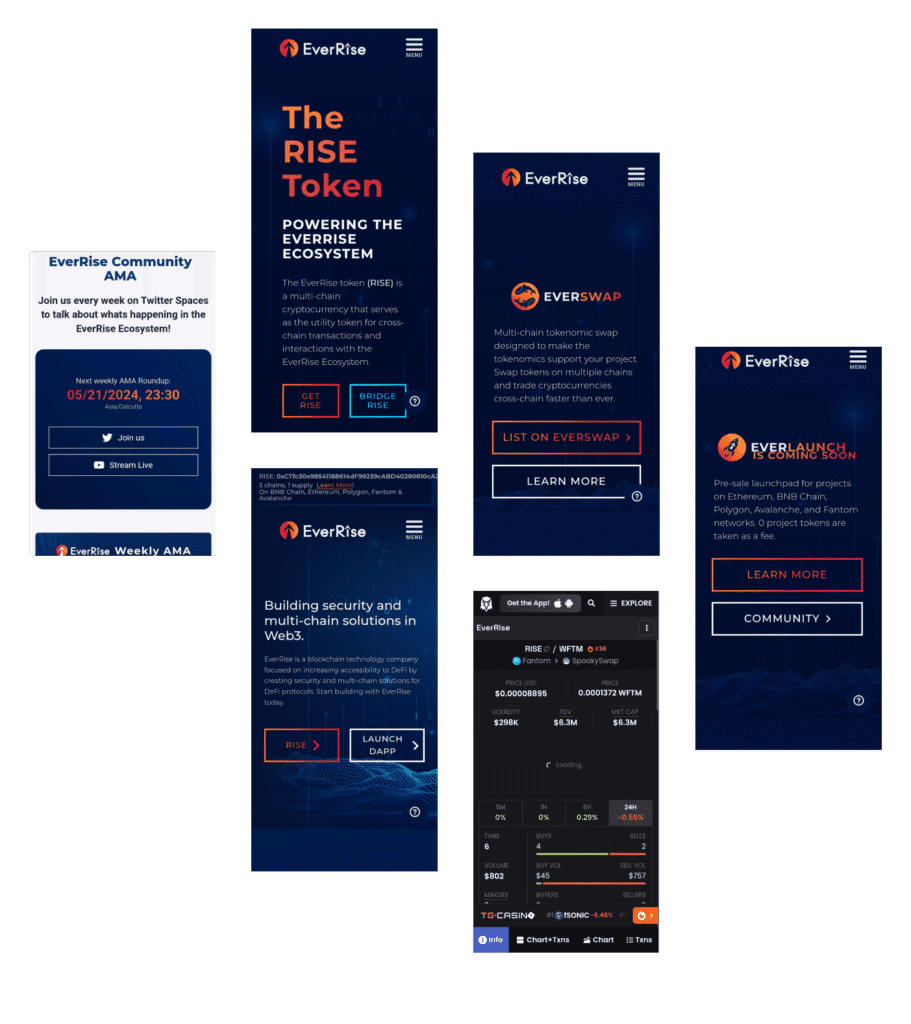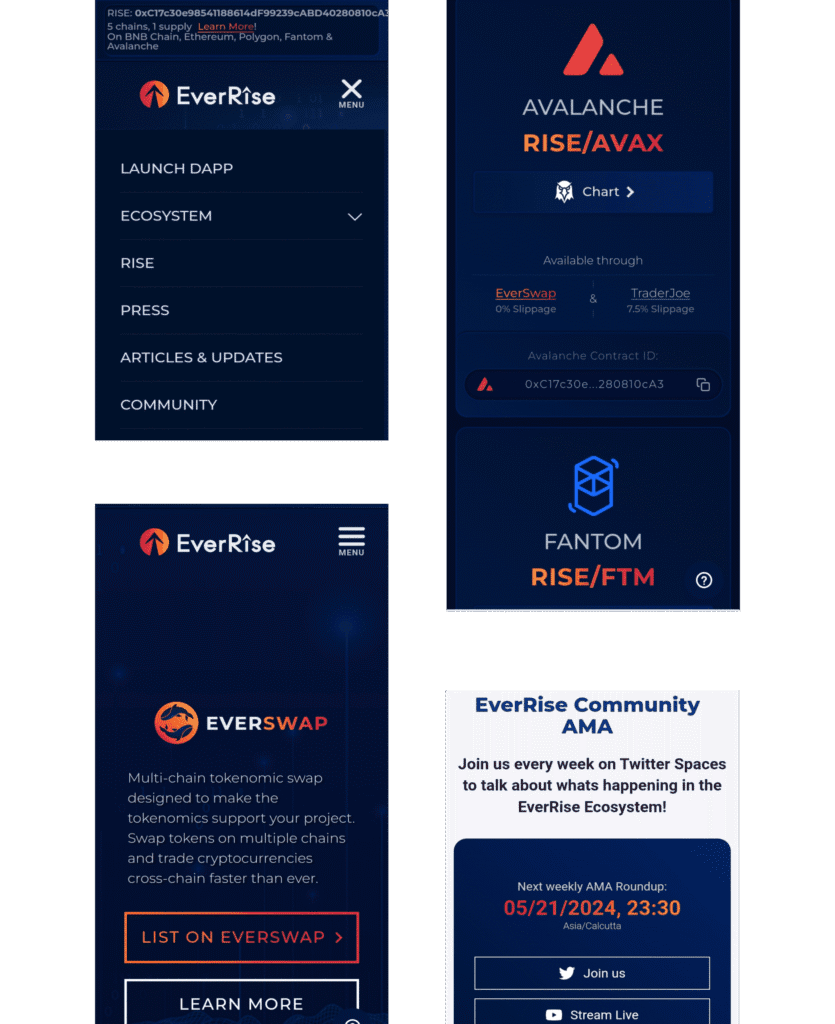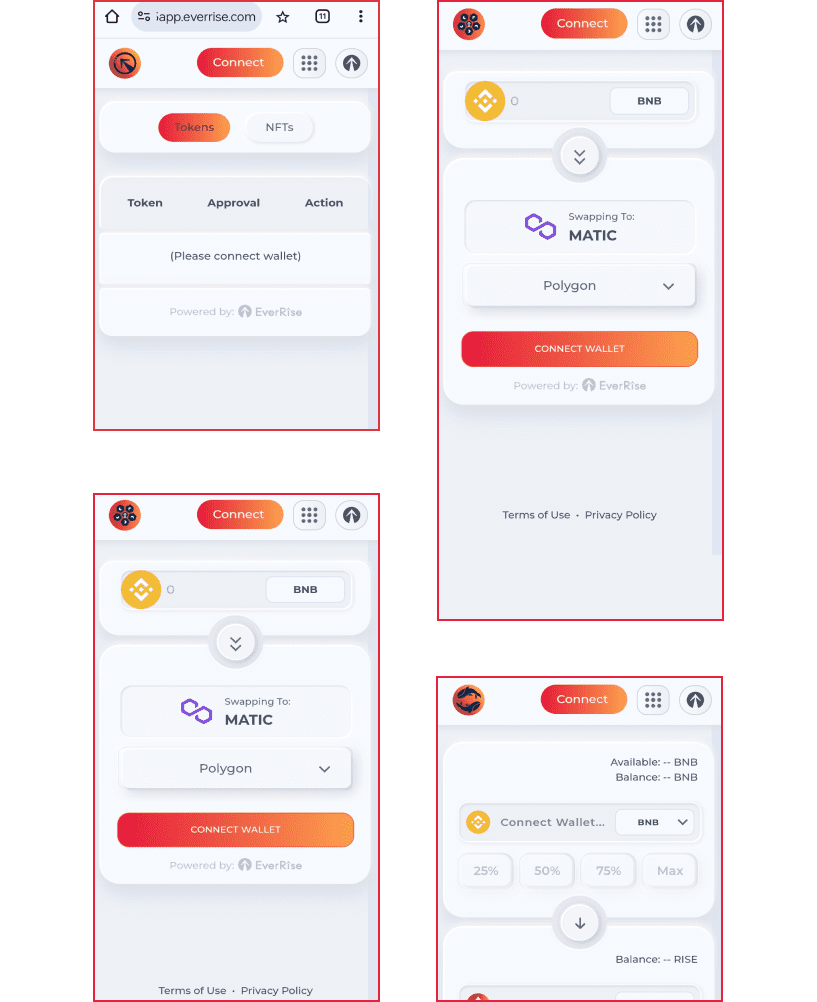
Explore Blockchain, Navigate Easily
EverRise is a blockchain technology company dedicated to enhancing DeFi accessibility through security and multi-chain solutions. Its ecosystem includes a variety of decentralized applications (dApps) designed to secure projects and individual investments in the DeFi space. These dApps operate across Ethereum, BNB Chain, Polygon, Avalanche, and Fantom networks, offering services such as token swaps, cross-chain transfers, smart contract management, migration solutions, NFT Staking, and launchpad functions.

Get Started with this product
Allows users to manage and revoke the permissions granted to external contracts and applications on their tokens, enhancing security and control over token usage.
Facilitates token swaps within its own network as well as across other supported blockchains, enabling seamless trading experiences.
Provides tools for transferring tokens across different blockchains, addressing common challenges in cross-chain interactions.
Lets project owners temporarily transfer contract ownership to a decentralized autonomous organization (DAO), enabling safer upgrades and maintenance.
Assists projects in migrating their tokens from one blockchain to another, simplifying the transition process while maintaining security and integrity.
A launchpad that helps new projects debut their tokens across multiple chains with features designed to thwart bot activity and ensure fair launches.
Aims to secure liquidity pools by locking up liquidity provider tokens, offering project developers and investors added security against potential rug pulls.
A secure wallet designed specifically for interacting with the EverRise ecosystem and its various features, providing robust security measures.
EverRise’s client prioritized the security and control of users’ assets and transactions across all platform features. They demanded a robust security protocol for EverRevoke, EverBridge, and EverWallet, ensuring stringent measures against potential threats such as hacks, fraud, and unauthorized access. The client sought advanced encryption techniques, multi-factor authentication, and tamper-proof smart contracts to instill confidence among users regarding the safety and integrity of their assets within the EverRise ecosystem.
EverRise emphasized the necessity of seamless token swapping and liquidity provision through EverSwap to enhance the trading experience for users. The client required a user-friendly interface with intuitive navigation, fast transaction processing, and real-time liquidity updates. They aimed to implement smart contracts for automated liquidity generation, ensuring continuous liquidity provision and stability for the platform’s native token. By facilitating hassle-free token swaps and efficient liquidity management, EverSwap aimed to boost user engagement and liquidity depth within the EverRise ecosystem.
They sought to empower the community by enabling participation in governance decisions, token launches, migrations, and project lock-ins. Transparent processes, decentralized decision-making, and mechanisms for community-driven initiatives were essential to foster trust, ownership, and long-term viability within the EverRise ecosystem. By prioritizing community engagement and governance, EverRise aimed to cultivate a vibrant and committed user base invested in the success and growth of the platform.

In PoW, miners compete to solve complex mathematical puzzles to validate transactions and create new blocks. This mechanism is renowned for its security but is energy-intensive and has scalability issues.
PoS validators are chosen to validate transactions based on the amount of cryptocurrency they hold and are willing to “stake” as collateral. It’s energy-efficient compared to PoW and often used in DeFi projects due to its scalability and security.
DPoS is a variant of PoS where token holders vote for a limited number of delegate validators, who then secure the network. This speeds up transactions and is suitable for platforms needing faster performance, as seen in some DeFi applications.
PoSpace relies on participants’ hard drive space rather than computational power to validate transactions. It’s considered more environmentally friendly than PoW but may be less secure against certain types of attacks.
Approved validators confirm transactions, offering fast and efficient processing. Ideal for permissioned blockchains, PoA suits DeFi networks requiring trusted participants and streamlined consensus mechanisms.
Users burn coins by sending them to unusable addresses, gaining mining or validation rights. PoB ensures fair coin distribution and encourages long-term network participation through economic sacrifice.
Visual identity and design elements
Primary font family and usage

Brand colors
#d02641
#f9a531
#001f42
Project Approach: EverRise adopted a strategic approach focused on integrating blockchain technologies across multiple platforms, aiming to create a unified and robust decentralized finance (DeFi) ecosystem. This vision centered around seamless interoperability, allowing users to interact across different blockchains without friction. By prioritizing cross-chain functionality, EverRise enabled efficient transactions, streamlined smart contract deployment, and enhanced platform security. Their infrastructure was designed to optimize user experience while maintaining high-performance standards, catering to both developers and everyday users. Tools and protocols developed under this initiative ensured compatibility with popular blockchain networks, promoting ease of access and broader utility. This multi-platform integration also fostered innovation by allowing decentralized applications (dApps) to operate more flexibly.
Results: The strategic multi-chain integration significantly strengthened EverRise’s position in the DeFi space, transforming the platform into a versatile and scalable ecosystem. By enabling interoperability between different blockchain networks, EverRise addressed the growing demand for flexible financial tools in the decentralized economy. This capability attracted a wide array of users, from individual investors to institutional participants, thanks to its enhanced accessibility and user-centric design. The platform’s seamless cross-chain functionality facilitated easy adoption and increased transaction efficiency, allowing users to interact with DeFi products without being restricted to a single blockchain. As a result, EverRise experienced a surge in community engagement, trust, and credibility within the crypto industry.

Ensuring robust security measures across different blockchain networks involves navigating the complexities of varying protocols and security standards. Each blockchain has its own unique features and potential vulnerabilities, requiring meticulous attention to detail in designing and implementing security protocols. Techniques such as thorough code auditing, encryption, and multi-signature authentication can help mitigate risks.
Achieving seamless interoperability among diverse blockchains is a complex endeavor that demands advanced technological integration and coordination. Interoperability protocols, such as Cross-Chain Bridges and atomic swaps, enable assets to be transferred and exchanged across different blockchain networks.
Balancing complex functionalities with user-friendly interfaces is crucial for driving adoption and retention in the blockchain space. With operations ranging from token swaps to NFT staking and cross-chain bridges, users must be able to navigate the platform intuitively and efficiently.
Through innovation and community-driven governance, the mining app emerged as a promising platform for decentralized collaboration, paving the way for a more inclusive ecosystem.

This concise overview highlights the key components of the technology stack powering INRx Pay, ensuring secure, efficient, and seamless transactions for its users.





